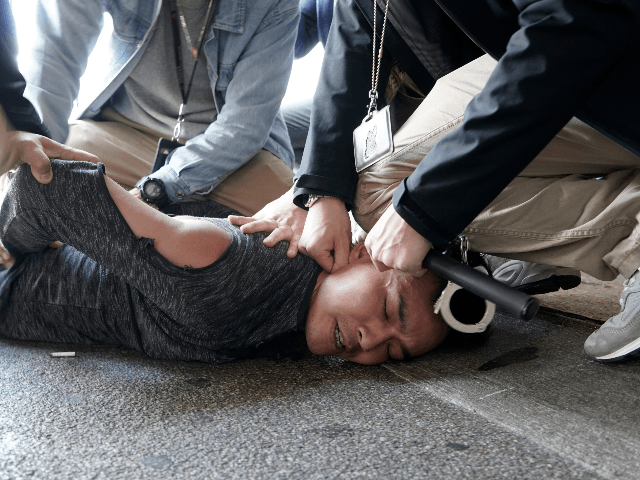Hong Kong’s new fire chief Joseph Leung on Wednesday dismissed criticism that he referred to pro-democracy protesters as “cockroaches” during a lecture at the Fire and Ambulance Services Academy in October.
“The streets are unsafe because there are a lot of cockroaches, if you film them, they will hit you,” Leung said during the speech.
The Hong Kong Free Press (HKFP) reported that Leung is attempting to deflect outrage over his remark by claiming the speech was not a “public statement” and insisting anger should be directed at violent radicals, who he implied are the only subset of the protest movement he thinks should be treated like insects:
The use of dehumanizing language is historically controversial. During the tragic events of World War II through to the Rwandan genocide, targeted groups were described as inferior “cockroaches” or “rats.”
When asked if he would refer to protesters as “cockroaches” again, Leung said he had never made such a comment publicly and had no intention to do so. He hit back at critics as “puffing up” the controversy, adding that his comment was “an entirely different level compared to violent protesters.”
“If you have to criticize, why don’t you criticize and condemn the violent protesters?” Leung asked, adding that the incident had been reviewed by the former department head and the Civil Service Bureau.
Leung’s attitude toward the protest movement is particularly relevant because members of his department were involved in the demonstrations. Hong Kongers sympathetic to the protesters argue that unreasonable investigations and disciplinary actions were inflicted on members of the Fire Services Department who did not toe the pro-Beijing political line:
Leung revealed that a total of 11 staff members of the Fire Services Department had been arrested during the anti-extradition bill unrest, so far two were released unconditionally.
The department also received complaints against around 130 personnel, who were accused of making inappropriate comments online – some involved profanity and criticism against the police force.
More than half of the complaints were found to be invalid after an inquiry, though disciplinary action would be taken if the use of improper language was found, Leung said. However, he did not comment on the details of the investigation criteria and what wording would constitute a valid complaint.
Leung insisted at his press conference that politics would not influence his management of the department.
“When anyone needs help, or when anyone’s life is threatened, we should do everything we can to rescue them, no matter whether that person is a citizen, the law enforcer or even a violent protester,” he said.
The South China Morning Post on Friday talked with lawyer Antony Dapiran, author of a book on the 2019 movement called City on Fire: The Fight for Hong Kong. Dapiran cited “lawfare,” the use of specious or exaggerated criminal complaints against demonstrators and supporters of the movement, as one of the worst excesses of Hong Kong’s Beijing-controlled government during the long political crisis.
Dapiran thought the coronavirus pandemic put an end to daily or weekly mass demonstrations, but predicted the movement would endure, possibly reasserting its presence on the streets during the July 1 anniversary of the storming of Hong Kong’s Legislative Council chambers, a milestone event that marked the moment when protesters began attacking the system instead of trying to work within it.
Protesters might not be filling the streets at the moment, but they remain defiant and are still doing what they can to spread their message, and the authorities are still bending the law to muzzle them.
Dapiran’s scorecard for the movement was mixed. In the end, it did manage to assert itself through the system, with landslide victories for pro-democracy candidates in the last legislative elections – but one of the primary complaints of the movement is that Beijing holds all the real power by rigging the executive branch to be controlled by its loyalists.
For its part, Beijing can write off its political and economic losses from 2019, and perhaps even write off a generation of Hong Kong youth as “lost” to communism, while considering its long-term objectives for the island secure. The protesters did not get all of their “Five Demands,” so Beijing and its operatives in the Hong Kong executive may conclude that stubborn intransigence worked for them.
If Dapiran’s analysis is correct, and the Chinese Communist Party tallies the same score in Hong Kong, then pro-democracy activists have reason to worry about stridently pro-Beijing officials who view them as cockroaches embarking on a political purge to force them out of government agencies.

COMMENTS
Please let us know if you're having issues with commenting.